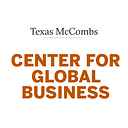Through the Portal: Global Shifts in Leadership
David Gallagher, President of Growth and Development, Omnicom Public Relations Group
Way back in April, during the first pandemic lockdown in London, I was asked to give a talk for a professional community (via Zoom, such a novelty then) on the effects we could expect on our industry, on business more generally, and on personal approaches to leadership. The “industry” in question was marketing communications and public relations, really a subset of the news, media and information sector, and “business” was the many companies and enterprises both private and public we advise around the world.
Now hopefully halfway through a second lockdown in England, I was asked to look at similar questions for the Center for Global Business and its Global Shifts series of conversations, and I thought I would see how well my earlier thoughts have held up. Mixed, it seems. I missed quite a bit: widespread protests over social injustice, better than expected economic recovery in at least some sectors, and horrific COVID19 mortality rates in my home and adopted homes, the United States and the United Kingdom.
Other thoughts seemed obvious then and proved to be so. The presidential election was indeed convulsive and divisive, and buoyant equities markets did and still do in fact mask the sad reality of food bank-reliance and record-level unemployment for millions in the US and elsewhere. People fight wearing masks.
And I flat out misunderstood one concept I thought then illustrated the path we were about to take. Paraphrasing the author Arundhati Roy, I thought the pandemic represented a “portal” through we which we would pass and, once on the other side, choose which dead old ideas we would leave behind and which we could invent anew. Now to me, a portal is like a door, a separation between two spaces, quickly crossed. Turns out, it’s more like a very long and winding tunnel, taking months if not years to transverse. And we’re not through it yet.
So, time will tell if the remainder of my thoughts from last April will hold up in 2021 and beyond.
For our industry, alarm bells. With the pandemic, by coincidence or correlation, we saw an explosion of fake news and misinformation, the profligacy of conspiracy and conspiracy theory, the emergence of data as the currency of attention-based journalism, and a collapse of trust in science and expertise. These are just some of the factors undermining the marketplace of ideas — the trading floor our industry exists to serve, and the foundation of democracy and responsible capitalism. I urged colleagues to take collaborative action, rather than to seek competitive advantage.
For business generally, a wake-up call for purpose, or at least recognition of the need to stake a stand on the issues important not just to investors, but to customers, employees and the community. I read somewhere that when the tide goes out, you see who’s swimming naked, and it’s not always pretty. Some businesses responded well to the pandemic and related social tumult, reasserting commitments to safety, wellbeing and inclusion; others are still finding their bearings. But a look at the capital flow from some of the most important investment houses tells you what you need to know about their priorities for a post-COVID economy and the critical importance of environmental, sustainability and governance impact. Also, public-private partnerships, multilateral stakeholder engagement and a serious effort on climate change all seem more likely in an effort to build back better.
And for new approaches to leadership? The word I hear most often from clients, and the one that resonates most clearly in my own head is “humility.” If the pandemic has taught us one thing, it’s that as bad as we are predicting things, we are even worse at controlling them. With humility come a few other novelties for many like me — white, male and privileged — including empathy, presence and gratitude.
Finally, I was not asked then, but I am prompted now, to think about the kinds of knowledge students and graduates might look to acquire to help navigate a new reality. I tell journalism and advertising students, take a course in economics, understand basic accounting, and read up on statistics. For business majors and MBA candidates, watch some lectures on human psychology, keep a journal and take in an art museum from time to time. Skills are simpler, but tougher: listening, supporting and extending the ideas of others are all things I continue to work on.
Good luck out there.
